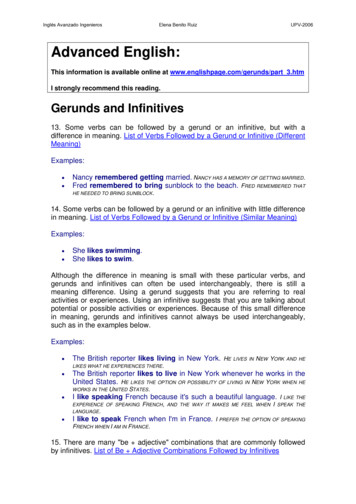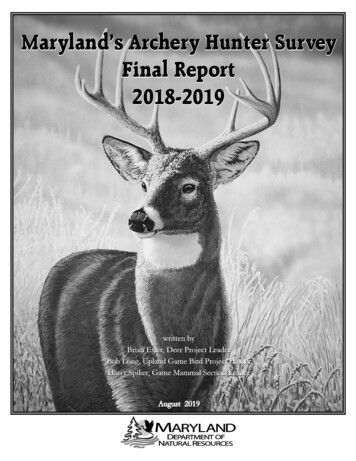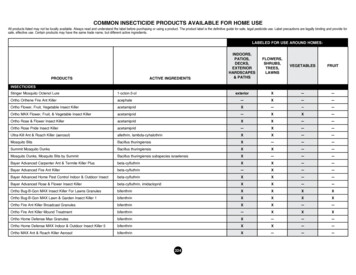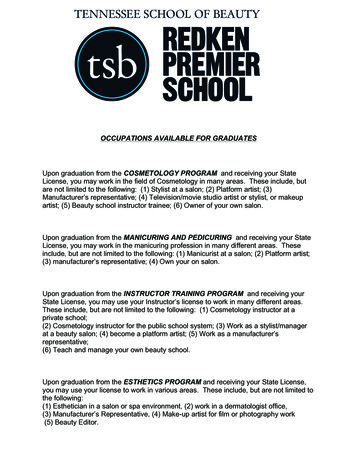
Transcription
Inglés Avanzado IngenierosElena Benito RuizUPV-2006Advanced English:This information is available online at www.englishpage.com/gerunds/part 3.htmI strongly recommend this reading.Gerunds and Infinitives13. Some verbs can be followed by a gerund or an infinitive, but with adifference in meaning. List of Verbs Followed by a Gerund or Infinitive (DifferentMeaning)Examples: Nancy remembered getting married. NANCY HAS A MEMORY OF GETTING MARRIED.Fred remembered to bring sunblock to the beach. FRED REMEMBERED THATHE NEEDED TO BRING SUNBLOCK.14. Some verbs can be followed by a gerund or an infinitive with little differencein meaning. List of Verbs Followed by a Gerund or Infinitive (Similar Meaning)Examples: She likes swimming.She likes to swim.Although the difference in meaning is small with these particular verbs, andgerunds and infinitives can often be used interchangeably, there is still ameaning difference. Using a gerund suggests that you are referring to realactivities or experiences. Using an infinitive suggests that you are talking aboutpotential or possible activities or experiences. Because of this small differencein meaning, gerunds and infinitives cannot always be used interchangeably,such as in the examples below.Examples: The British reporter likes living in New York. HE LIVES IN NEW YORK AND HE The British reporter likes to live in New York whenever he works in theUnited States. HE LIKES THE OPTION OR POSSIBILITY OF LIVING IN NEW YORK WHEN HELIKES WHAT HE EXPERIENCES THERE.WORKS IN THE UNITED STATES. I like speaking French because it's such a beautiful language. I LIKE THEEXPERIENCE OF SPEAKINGLANGUAGE. FRENCH,AND THE WAY IT MAKES ME FEEL WHENISPEAK THEI like to speak French when I'm in France. I PREFER THE OPTION OF SPEAKINGFRENCH WHEN I AM IN FRANCE.15. There are many "be adjective" combinations that are commonly followedby infinitives. List of Be Adjective Combinations Followed by Infinitives
Inglés Avanzado IngenierosElena Benito RuizUPV-2006Examples: They were anxious to begin.She was delighted to receive such good feedback.He is lucky to have such good friends.16. There are also many nouns that are commonly followed by infinitives. List ofNouns Followed by InfinitivesExamples: It was a good decision to move to San Francisco.His wish to become an actor was well known.Laura's desire to improve impressed me.17. Sometimes infinitives are used to express the idea of "in order to dosomething."Examples: He bought the English dictionary to look up difficult words.IN ORDER TOLOOK UP Janine sold her car to get the money that she needed. IN ORDER TO GETJuan uses Englishpage.com to learn English. IN ORDER TO LEARNThis idea of "in order to do something" is found in many English patterns.too adjective/adverb infinitiveExamples: The box is too heavy to carry.The television is too expensive to buy.Fiona ran too slowly to win the race.We arrived too late to see the beginning of the movie.adjective/adverb enough infinitiveExamples: She is tall enough to reach the book on the shelf.Brian was smart enough to enter college at the age of 12.Linda runs quickly enough to win the race.enough noun(s) infinitiveExamples: He has enough money to buy his own car.Cheryl owns enough books to start her own library!
Inglés Avanzado Ingenieros Elena Benito RuizUPV-2006Diane needs enough time to finish writing her book.18. Certain expressions are followed by "ING" forms. List of Expressionsfollowed by Verb ing FormsExamples: He had fun fishing.They had difficulty finding a parking place.She spent her time practicing the piano.19. Verbs which indicate location can often be followed by "ING" forms. Thispattern is VERB OF LOCATION LOCATION VERB ING. List of Verbs ofLocationExamples: Sarah stood at the corner waiting for Tom.Melissa lay in bed thinking about her future.Don clung to the side of the cliff looking down.20. In addition to simple gerund and infinitive forms, there are progressivegerund and infinitive forms, passive gerund and infinitive forms and perfectgerund and infinitive forms as well as combinations of these forms. Progressiveforms are used to emphasize that an action is taking place now. Passive formsare used to emphasize that the subject of the sentence is being acted upon.Perfect gerund and infinitive forms are used to emphasize completion in boththe past and the future. Study the examples below to help understand theseconcepts. To learn more about progressiveness, the passive voice and theperfect aspect, complete the Englishpage.com Verb Tense Tutorial.GERUND FORMSINFINITIVE FORMSSIMPLETheteacherteaching.PROGRESSIVEMr. Smith is really enjoyingteachinghisclass.LOOKS THEABOVE.enjoysThe teacherteach.wantstoMr. Smith would like to beteaching his class.SAME AS SIMPLE FORMPASSIVEThe students enjoy beingtaught.The students want to betaught.PERFECTThe retired teacher recalledhaving taught.Theteacherwasexpecting to have taughtthat already.The students are enjoyingThe students would like toPASSIVE
Inglés Avanzado IngenierosElena Benito RuizPROGRESSIVEUPV-2006being taught by such anexcitingnewteacher.be being taught by MrSmith.LOOKSTHE SAME AS THE PASSIVEFORM ABOVE.PASSIVEPERFECT The older students recalledhaving been taught thatalready.Thestudentswereexpecting to have beentaught that by now.Verbs Followed by Gerunds ORInfinitives (Different Meaning)beginShe began singing.She began to sing.WHEN "BEGIN" IS USED IN NONCONTINUOUS TENSES, YOU CAN EITHERUSE A GERUND OR AN INFINITIVE.dreadShe dreaded taking the test.USUALLY "DREAD" IS FOLLOWED BY AGERUND.forgetWHEN "BEGIN" IS USED IN CONTINUOUSTENSES, AN INFINITIVE IS USED.He dreaded to think of theconsequences of his actions."DREAD" IS SOMETIMES USED WITHINFINITIVES SUCH AS "THINK" OR"CONSIDER." IN THE SENTENCE ABOVE,"DREADED TO THINK" MEANS "DID NOTWANT TO THINK."She forgot reading the bookwhen she was a kid.She forgot to pay the rent thismonth.WHEN "FORGET" IS USED WITH AGERUND, IT MEANS "TO FORGET THATYOU HAVE DONE SOMETHING." THEWHEN FORGET IS USED WITH AN INFINITIVE,IT MEANS "TO FORGET THAT YOU NEED TODO SOMETHING." THE SENTENCE ABOVEMEANS THAT SHE FORGOT THAT SHENEEDED TO PAY THE RENT.SENTENCE ABOVE MEANS THAT SHEREAD THE BOOK WHEN SHE WAS A KID,AND THAT SHE HAS FORGOTTEN THATFACT.keepShe is beginning to sing.She kept talking.The attackers kept hostages toprevent the police from entering."KEEP" IS NORMALLY USED WITH AGERUND TO MEAN THAT YOU CONTINUEDOING AN ACTION."KEEP" CAN ALSO BE USED WITH ANOBJECT FOLLOWED BY AN INFINITIVE, BUTTHEN THE INFINITIVE TAKES ON THEMEANING OF "IN ORDER TO. ." IN THESENTENCE ABOVE, THE ATTACKERS KEPTHOSTAGES IN ORDER TO PREVENT THEPOLICE FROM ENTERING.
Inglés Avanzado IngenierosneedElena Benito RuizThe house needs cleaning.WHEN "NEED" IS USED WITH AGERUND, IT TAKES ON A PASSIVEMEANING. THE SENTENCE ABOVEMEANS "THE HOUSE NEEDS TO BECLEANED."regretI regretted being late to theinterview."REGRET" IS NORMALLY USED WITH AGERUND.rememberstartUPV-2006He needs to call his boss.He needs him to call his boss."NEED" IS USUALLY USED WITH ANINFINITIVE OR AN OBJECT AN INFINITIVE.We regret to inform you that yourposition at the company is beingeliminated."REGRET" IS SOMETIMES USED WITHINFINITIVES SUCH AS "TO INFORM." IN THESENTENCE ABOVE, "WE REGRET TOINFORM YOU" MEANS "WE WISH WE DIDNOT HAVE TO TELL YOU (BAD NEWS)."I remember mentioning themeeting yesterday.He remembered to turn off thelights before he left.WHEN "REMEMBER" IS USED WITH AGERUND, IT MEANS "TO REMEMBERTHAT YOU HAVE DONE SOMETHING."THE SENTENCE ABOVE MEANS THAT IMENTIONED THE MEETING, AND THAT IREMEMBER THE FACT THAT I DID THAT.WHEN "REMEMBER" IS USED WITH ANINFINITIVE, IT MEANS "TO REMEMBER THATYOU NEED TO DO SOMETHING." THEMarge started talking reallyfast.Marge started to talk reallyfast.Marge is starting to talk reallyfast.WHEN "START" IS USED IN NONCONTINUOUS TENSES, YOU CAN EITHERUSE A GERUND OR AN INFINITIVE.SENTENCE ABOVE MEANS THAT HEREMEMBERED THAT HE NEEDED TO TURNTHE LIGHTS OFF.WHEN "START" IS USED IN CONTINUOUSTENSES, AN INFINITIVE IS USED.I started to learn Russian, but itwas so much work that I finallyquit the class.IN OTHER SITUATIONS, AN INFINITIVE MEANSTHAT YOU DID NOT COMPLETE ORCONTINUE AN ACTION.stoptryHe stopped smoking forhealth reasons.He stopped to rest for a fewminutes."STOP" IS NORMALLY USED WITH AGERUND.WHEN "STOP" IS USED WITH AN INFINITIVE,THE INFINITIVE TAKES ON THE MEANING OF"IN ORDER TO." IN THE SENTENCE ABOVE,HE STOPPED IN ORDER TO REST FOR A FEWMINUTES.She can't find a job. She triedlooking in the paper, but thereShe tried to climb the tree, butshe couldn't even get off the
Inglés Avanzado IngenierosElena Benito Ruizwas nothing. She tried askingfriends and family, but nobodyknew of anything. She alsotried going shop to shop, butnobody was hiring."TRY GERUND" MEANS TO TRY OR TOEXPERIMENT WITH DIFFERENTMETHODS TO SEE IF SOMETHINGWORKS.She tried eating the snakesoup, but she didn't like it."TRY GERUND" IS OFTEN USED WHENYOU EXPERIMENT WITH SOMETHING,BUT YOU DO NOT REALLY LIKE IT ORWANT TO DO IT AGAIN.UPV-2006ground.WHEN YOU "TRY TO DO" SOMETHING, YOUWANT TO DO IT, BUT YOU DO NOT SUCCEEDIN ACTUALLY DOING IT. IN THE SENTENCEABOVE, AN INFINITIVE IS USED BECAUSESHE CANNOT SUCCESSFULLY CLIMB THETREE.Try not to wake the baby whenyou get up tomorrow at 5 AM.AN INFINITIVE IS ALSO USED IF YOU AREASKING SOMEONE TO TRY SOMETHINGTHEY MAY OR MAY NOT BE ABLE TOACCOMPLISHBe Adjective CombinationsFollowed by Infinitivesbe amazedHe was amazed to discover the truth.be anxiousShe was anxious to start her new job.be ashamedHe was ashamed to admit he had lied.be boundShe is bound to be elected class president.be carefulThey were careful not to reveal the winner of the prize until theend.be certainShe is certain to get the job.be contentThe student was content to receive second place in thecompetition.be delightedWe were delighted to be invited to the wedding.bedeterminedHe was determined to finish the marathon.be eagerHe was eager to begin.
Inglés Avanzado IngenierosElena Benito RuizUPV-2006be eligibleThey were not eligible to participate in the program.be fortunateShe was fortunate to receive the research grant.be gladI would be glad to help out.be happyShe was happy to see them at the party.be hesitantMary was hesitant to say anything.be liableThe mountain climber is liable to hurt himself if he doesn't usewell-made equipment.be likelyThey are likely to show up at any time.be luckyYou were lucky to have such an opportunity.be pleasedI am pleased to meet you.be proudHe was proud to have been chosen to lead the project.be readyI'm ready to go now.be reluctantThe witness was reluctant to reveal what he had seen.be sadShe was really sad to leave.be shockedHe was shocked to discover the truth.be sorryI am sorry to have to tell you that the tickets are sold out.be surprisedShe was surprised to discover that he had never learned howto swim.
Juan uses Englishpage.com to learn English. IN ORDER TO LEARN This idea of "in order to do something" is found in many English patterns. too adjective/adverb infinitive Examples: The box is too heavy to carry. The television is too expensive to buy. Fiona ran too slowly to win the race. We arrived too late to see the beginning of the movie. adjective/adverb enough .











